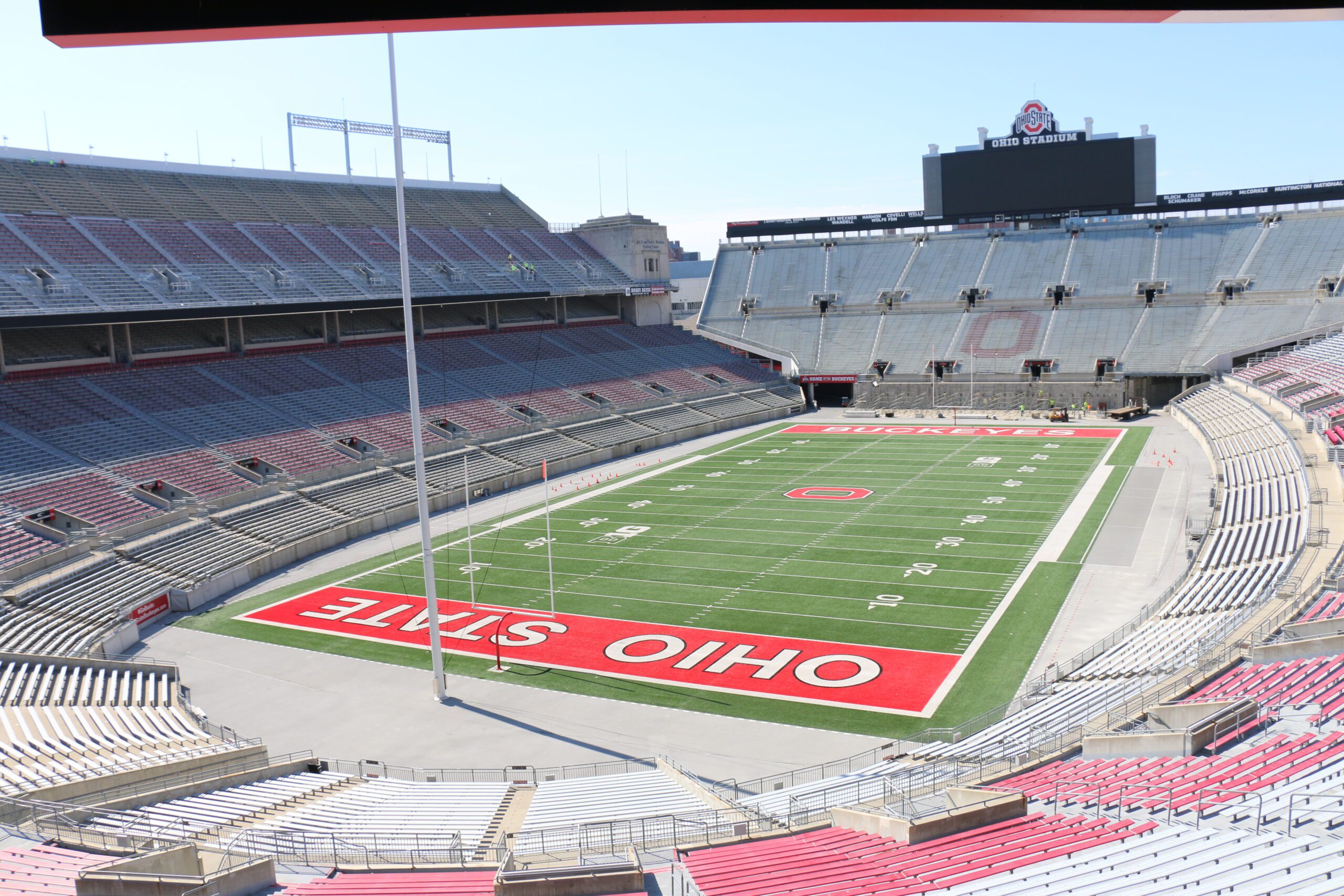To say that athletics are big at The Ohio State University is an understatement. The athletic department’s spending and revenue both eclipsed the $200 million mark in 2020 (and revenues did exceed spending). While OSU has over 30 variety sports, football reigns as king. Besides being dominant in the Big Ten Conference, The Ohio State Buckeyes have won eight national titles since 1940, third among NCAA schools. Football also produces nearly 50% of the athletic department’s revenues while accounting for under a quarter of its expenses.
Although football’s on-the-field and in-the-bank successes are prized by the university and the athletic department, both also place great importance on the environment. OSU’s sustainability efforts began at the university in 2006 and in the athletic department in 2007, with recycling programs inside Ohio Stadium and in the tailgate lots. In 2008, the university signed the American College & University Presidents’ Climate Commitment (ACUPCC) to achieve carbon neutrality by 2050.

OSU’s athletic department demonstrated its leadership role in prioritizing sustainability when, in 2018, it was just one of only four Power Five athletics programs to sign the United Nations-conceived Sports for Climate Action Framework, whose goals include more coordinated efforts in promoting greater environmental responsibility and sustainable consumption.
The Ohio State University released its comprehensive sustainability plan in 2011 and the athletic department launched its zero-waste program that same year. In year one, Ohio Stadium reached a 75% diversion rate. That percentage jumped to 87% in 2012, highlighted by attaining a 98.2% at one game. These feats are even more remarkable when you consider that Ohio Stadium is one of the NCAA’s largest with a 102,000+ capacity.
The Natural Resources Defense Council declared the stadium’s “recycling and composting program has become the model for campus-wide ‘zero waste’ efforts at Ohio State as well as collegiate stadiums across the country.”
Ohio Stadium was the National Diversion Rate champ of the NCAA’s 2012 GameDay Recycling Challenge and its diversion rate also topped the Big Ten Conference from 2011-19. During that time period, in fact, the stadium surpassed the “Zero Waste” mark by averaging over a 92% diversion rate.
In 2020, a multi-year Ohio Stadium renovation project earned a Gold LEED certification from the US Green Building Council. The USGBC particularly praised the remodeled Premium Suites that featured such upgrades as energy-efficient light fixtures, efficient indoor heating system, water-saving appliances, and low-emitting paints and coatings along with low-emitting flooring.
Ohio Stadium’s renovation is one of several recent construction projects that earned LEED accolades in 2020. The Schumaker Complex, which serves 33 OSU teams, garnered a LEED Gold, plus a Sustainability Award from USG Corporation & the National Association of Collegiate Directors of Athletics. The Covelli Center (home to sports like volleyball, gymnastics, fencing, and wrestling) received a LEED Silver certification. Both facilities were commended for their handling of construction waste; their eco-minded transportation plan, and the use of water-efficient landscaping and low-emitting building materials.
The Schumaker and Covelli buildings’ LEED honors followed the earlier Silver certification for the Basketball Practice Facility inside the Schottenstein Center. Seventy-five percent of the center’s construction waste was recycled or salvaged, while at least 50% of its wood-based materials were Forest Stewardship Council-certified. Additionally, the building uses 20% less energy and 35% less water compared to the baseline figures.
The Schottenstein Center itself has been the site for “zero waste” events involving both men’s and women’s basketball along with the university’s Commencement ceremonies. The Buckeyes were RecycleMania’s National Diversion Basketball Champions in 2019 and 2020 after being the champs in the National Food Organics Diversion in 2016’s RecycleMania. In 2020, Ohio State also won a Case Studies Award for Education and Awareness in this National Wildlife Federation-organized competition.
Education and awareness – for both students and fans – are crucial factors behind Ohio State’s ecological accomplishments. OSU’s Department of Athletics Sustainability works with the local non-profit “I Am Change Outreach,” a mentorship program for area students ages 15-19, to make these youths members of the Zero Waste Team.
Volunteers serve as the initial sorters of stadium compost and recycling on game days as well as assisting fans at the Zero Waste stations. Fan engagement also is central to the Tailgate Recycling Program, where Zero Waste Educators inform folks about correct recycling procedures out in the parking lots. Similarly, the Zero Waste Suite Program helps to get suite owners invested in recycling. At least a third of the suites have signed up for this program.

If you’ve watched an Ohio State football game, you’ve probably noticed the distinctive leaf helmet stickers that players receive for excellent performances. The “leaf” also features prominently in the university’s sustainability initiatives. LEAF (Leadership of Environmental Athletes for Sustainability) is a student-led platform that helps student-athletics create eco-related projects. Sustainability awareness efforts by OSU’s synchronized swimming squad and fencing team are recent examples of LEAF’s impact.
OSU’s Golf Club also is contributing to making the university more sustainable. To make better use of its resources, the club has improved the golf course’s water conservation and fertilizing techniques (including utilizing compost created from Ohio Stadium’s Zero Waste Program). Additionally, the university’s course also served as a unique living classroom in 2020 for local middle schoolers who lent their hands in a tree-planting project that taught them about the environment and community service.
Well-known for its successful sports program, The Ohio State Athletic Department should be recognized too for its triumphs involving sustainability, especially regarding zero waste. The department’s achievements go a long way in assisting Ohio State to reach its admirable university-wide environmental goals.





